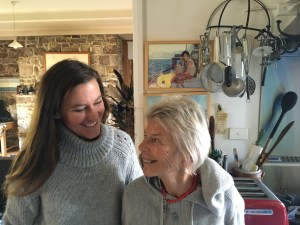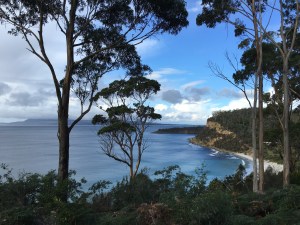
In my 20s I lived and worked in Hobart and spent holidays in Orford, doing the sort of stuff we take for granted in Tasmania. Typically: sailing, boating, fishing, snorkeling and diving.
Back then I remember watching a young girl with long, sun-bleached hair ride a horse bare back down the road to Millingtons’ Beach; two boys kept up on foot behind. Although not knowing who she was, I’ve carried her image with me throughout my life – a tantalizing reminder of the lifestyle I’d left behind to follow jobs in big cities. To me, that young girl oozed natural spirit and outdoor freedom – a symbol of a special Tassie way of life.
I’m telling you this because last week I happened to meet that girl – a young mum called Wilhelmina Rea. Now 32, with two boys Orlando, 4, and Denvor, 3, she still holidays in Orford, at Porthcawl, the home barged over from Maria Island during the Depression by her great grandfather Len Nettlefold.
Rea is one of a growing number of residents who’ve joined Marine Protection Tasmania Inc. They’re so alarmed about Tassal’s plans to develop a 28-pen fish farm in Okehampton Bay, Triabunna opposite the World Heritage Maria Island National Park, in April they started a campaign: “No Fish Farms In Tasmania’s East Coast Waters”. Vice President Grant Gaffney, who’s been diving on the east coast for 30 years, confirms 490 local and 1500 online signatories.
Locals walking their dogs on the front beach stop to swap the latest with Rea. They tell me they feel the concerns of families who’ve holidayed there for generations have largely been ignored. Information days, they say, do not equate to securing a social license. They’re worried the Marine Farm Planning Act was written in 1995, and want to see a new marine approval process for the fish farm instigated because the lease for fin fishing in Okehampton Bay was granted nearly two decades ago, to Spring Bay Seafoods. A lot has changed since then, they say, not least rising sea temperatures, toxic algal blooms, severe depletion of fish and abnormal coastal erosion.
Tassal, Australia’s largest salmon producer, stresses it has undertaken engagement in the area. “We may not have everyone on the same page,” says CEO Mark Ryan, “but we’re doing it within the rules and being accountable”. “For us to have a social license doesn’t mean we have to please every single individual.” Marine Protection Tasmania remains far from convinced – with some 2000 voices Tassal has failed to convert – and are focused on the next stage of their campaign.
I used to sail in a trailer sailer across to Maria from Orford, so I know what Rea means when she says she’s grown up swimming with dolphins in Chinaman’s Bay, fishing for crayfish in a bikini in knee-high deep water, floundering at night, and counting shooting stars through the boat cabin window. She shows me a photo of her, aged 2, in nappy and lifejacket, fishing with her father who’s holding up the biggest flathead you’re ever likely to see.

“I’ve always dreamt of doing that with my own children,” says Rea. “I want them to have the same experiences and opportunity on the East Coast as I have.” She says Orlando was in a boat when he was 3 weeks old, and Denvor even earlier than that. “I’m nurturing the same thing.” But with the onset of East Coast fish farms Rea believes much of that is at stake.
Orlando runs up to greet us on the beach with a fist-sized crab shell he’d just found. “Never in my wildest dreams would I think all this would be taken away from me,” observes Rea. She and her mother, Willie, are preparing for the kind of battle they never thought they’d have to fight. Already, Orlando talks of fish farms collectively as “poo poo fish farms”.

It’s not just her boys Rea cares about, but generations of other family histories she hopes to protect. Next to the old Aga in the Porthcawl kitchen hang two framed photos: her mother in the arms of Wilhelmina’s late father Robbie, on their honeymoon on Prosser Bay. Rea says her parents had packed up their Sydney lives in the back of a Holden after “cracking it in a traffic jam”. They even dug up the lemon tree and stuffed it in the boot of the car before driving to Tassie. That lemon tree survives and has broad branches now.

As children, Rea and her three brothers, fifth generation Nettlefolds, spent every weekend and entire school holidays going up the coast to Porthcawl, sailing to Maria Island in “The Rose”, four kids squeezed in with windsurfers, boogie boards, surfboards, diving gear, fishing, and “epic amounts of food”.
She says every day her mother worries about where else they will go if fish farms eventuate and the waters where they’ve played are changed for good. “Do we have to think about moving to Flinders Island?” she ponders.

Rea says she’s not against fish farms, just not in these waters. She knows there are more sustainable ways of farming fish and wonders why farming has to take place in the bay where locals have always played and fished.
Willie minds the two boys as Rea sifts through folders of facts, papers, and letters. Orlando wants his mum’s attention but she’s preoccupied, pointing out that Tassal’s proposed timeline of works for Okehampton Bay (detailed on their website) is starting shore base construction this year and installation of marine infrastructure in 2017.
“It’s not just me, but so many families share a proud connection to the culture of this coast,” says Rea. “I teach my boys how to catch crayfish from the paddleboard. Where else in the world can you get that? Where else can you light a fire on the beach and have lunch together eating fresh crayfish? If we have fish farms in our East Coast waters, chances are we won’t have that anymore.”
“Where else in the world?” matters. It brings us home to ourselves. Our island connections to land and sea matter, as much as our need to exploit them. Any doubts about that cause sleepless nights for those with caring hearts.

Tassal is holding an Information Display of the Okehampton lease and shore base operations at the Triabunna community hall next Saturday, June 18, 10 am – 2pm.
First published in TasWeekend, June 11 2016

A fabulous piece of writing, displaying the strong views shared by thousands of coastal loving Tasmanians. I am a dear friend of Wilhelmina and her family and share the same views she has about the fish farming proposals. It’s wonderful that such a strong young woman has the guts to stand and fight this environmental battle. I’m on her side and will be there to support her! Isn’t it about time Tassal looked after and preserved this precious marine environment and explored other options of production???!
Beautiful article. Not everything is for sale. Tassal cannot cannot define social engagement as only those who agree with them and ignore those with a true tie to the land. People are so itinerant these days it’s important to pay heed to the people that are vocal because they care not just those who are silent and their lack of of noise is taken as consent. Marine Protection Tasmania Inc fight the good fight are not motivated by money. When Tassal … leave the area… it will never be the same again. Just like resent events with Murray Goldburn and Fonterra have shown profit comes before all else. Call for a worldwide boycott of Tassal products immediately to send the message in the strongest terms that every individual has a powerful social license they can use to protect pristine natural environments.